W(H)eal, Healhtcare & Covid-19
International architecture prize in Pennsylvania, USA
First prize at the international architecture competition about Environmental Health Equity in Pennsylvania, USA
Urban context
Casablanca is a 20century modern city, With the development of its economy in the 50s, it became one of the biggest urban agglomerations in Africa. Today, the city is among the most densely populated cities in the world, the World Economic Forum (WEF) said, citing data from UN Habitat. Casablanca is ranked 5th after Dhaka, Mumbai, Medellin and Manila. According to the HCP, the population density in Casablanca reaches even higher levels exceeding 40,000 inhabitants /km2.
Today, Casablanca is aging, the city’s healthcare system suffers from chronic weaknesses, As a MIPA survey recently showed, citizens have a negative perception of their health care system, the public is mistrustful of the health care sector, and most community perceive health care services as low-quality.
international architecture prize in Pennsylvania, USA
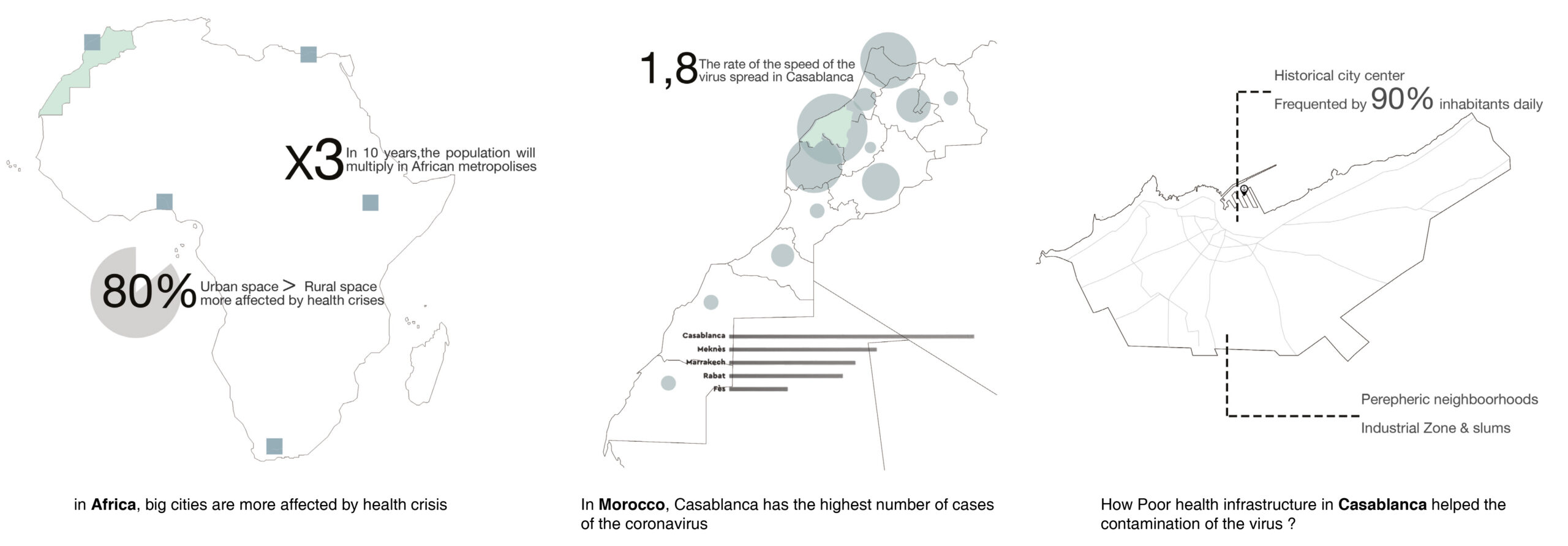
Framing the problem
Casablanca has the highest number of cases of the coronavirus in the country, with more than 100.000 cases reported by mid-November. The virus outbreak in the city is a perfect example of a fragile healthcare system and the risks it poses.
Poor health infrastructure will expose society to threats of epidemic and social injustice, especially in Casablanca where The health infrastructure was inherited from the ex-French colony, Healthcare facilities are located downtown, this centralized health system, is hardly accessible from the peripheral neighborhoods of the city, furthermore, those antiquated health care facilities built in the 40s, do not meet the standards of care needed in the 21st century and are diminishing the capacity of care at a time of crisis.
Those slums neighborhoods, even before the pandemic, always faced environmental health challenges. If health equity refers to a situation where all the people have the same opportunities to achieve optimal health, these slum neighborhoods in Casablanca are a concrete example of health inequity in the community.
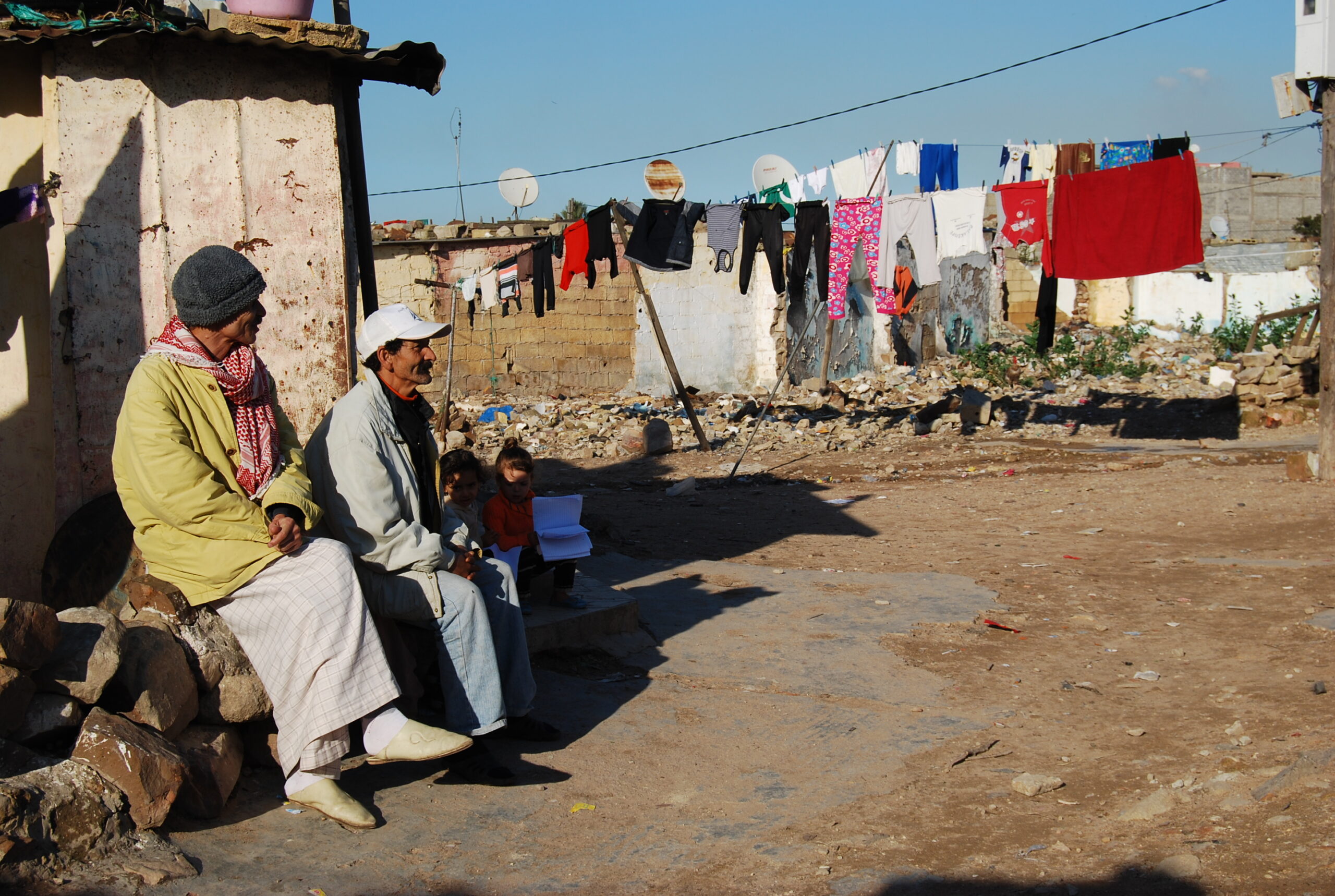
Implementing flexible plans to create systemic impact
We developed a set of principles driven by design to improve health outcomes that can be adapted to the specific needs of the city. An individual exemplary facility is not enough to achieve systemic change, and prototypical buildings poorly implemented can cause disastrous effects. Creating a model of high-quality infrastructure that can be easily adapted to different contexts can have a transformative effect on the city.
Better design and construction processes will produce not only better health
outcomes, but economic, educational, environmental, and emotional impacts to the community.
The chosen sites
Our system can be adapted to different scenarios and situations, it can be implemented for different locations in the city depending on each location’s needs, with two scales of intervention, varying from micro scale to city scale, from minimal to more complex and detailed, for the actual situation. We have chosen two exemplary sites with different contexts, scales, and challenges.

Concept: Rethinking Healthcare facilities
Our project draws it inspiration from two successive events in the city timeline:
February 28, 2020 : the new Casablanca bus fleet has started operating in the city, After the city’s decision to upgrade its public transport bus services, the old bus fleet (more than 400 buses) were dumped, remaining a real threat to the environment.
March 2, 2020: the health authorities of Morocco announced the first
case of contamination by the new coronavirus, local hospitals and healthcare
facilities warned they're not prepared for the impending coronavirus crisis.
A big metropolis, two serious problems, It is during these times that we are forced to look beyond the perceivable, think beyond the imaginable, to face the hurdles, and once we see those issues as challenges, each problem could become a solution to the other, how? Through design!
By using the old, yet abundantly available bus network system prevalent in the city. We offer an alternative use, capable of transforming as the need to an accessible, modular healthcare facility, particularly in dense urban areas, scalable from small to mid‐sized, especially in our situation, that also requires city level interventions: a network of healthcare facilities all over the city.
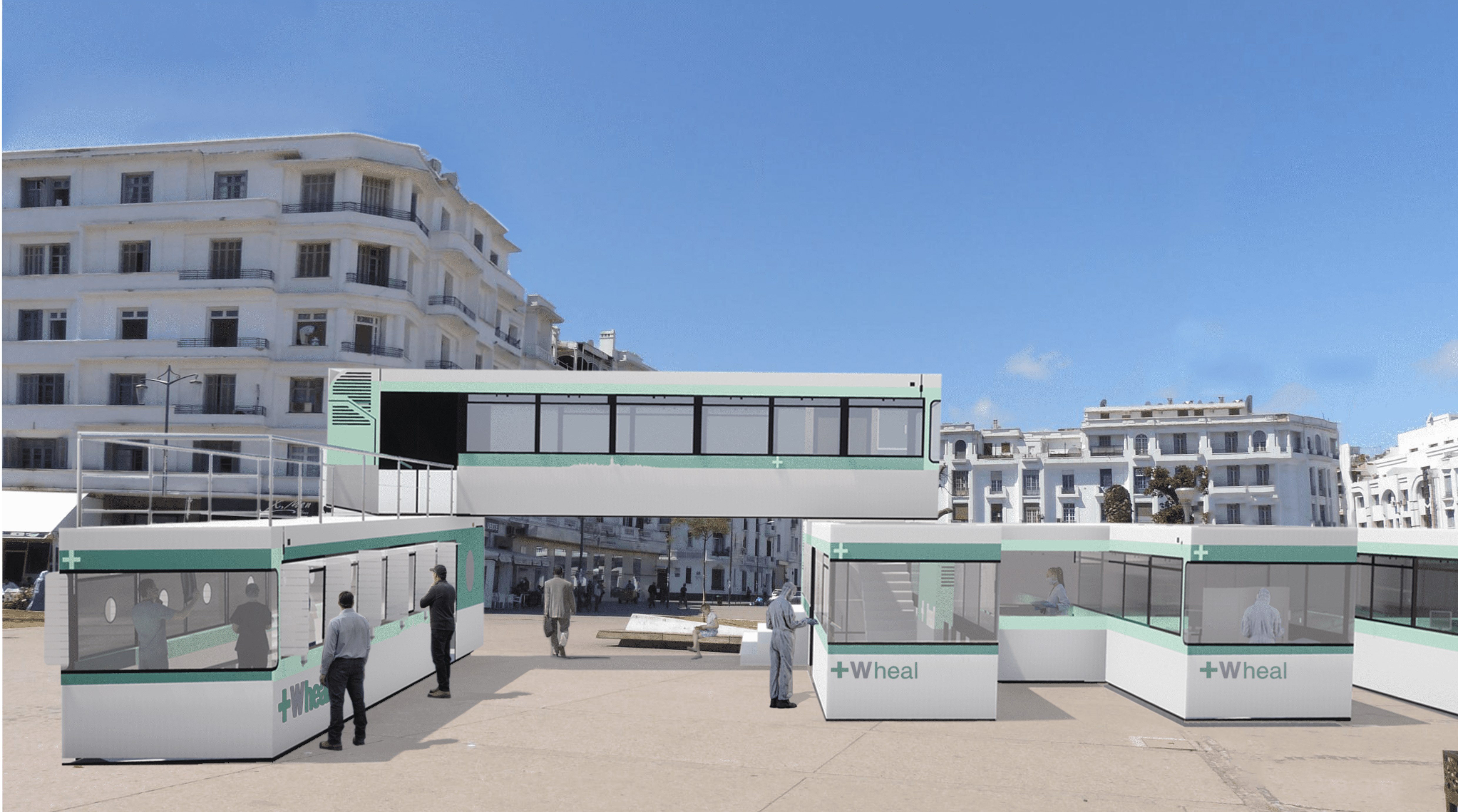
(W)heal (Healing on wheels) is a spatial protocol, far from being an isolated health care facility, the actual crisis forces us to rethink the common notion of actual healthcare facilities, and our project aims to redefine the way we think about those institutions in the future.
Easy to assemble and quick to both deploy and relocate, (W)heal can be placed in several spots in Casablanca like squares or parks, urban voids, encouraging new public spaces practices and also could function as a satellite hospital physically close to a larger hospital.
Using Care, Cure and Educate as guiding principles, this proposal merges the knowledge and simplicity, with the use of a local landmark to offer a functional, recognizable and socially integrated solution to this situation. Since this strategy needs to accommodate to a variety of contexts, the design bases its genetics on a variety of Interconnected principles:
W(H)eal project is adaptable, Multi-functional, Modular, scalable, ecological, quick, inexpensive, and easily replicated with less skillset required, minimum site operations, easily available materials, efficient logistics and minimum installation time.
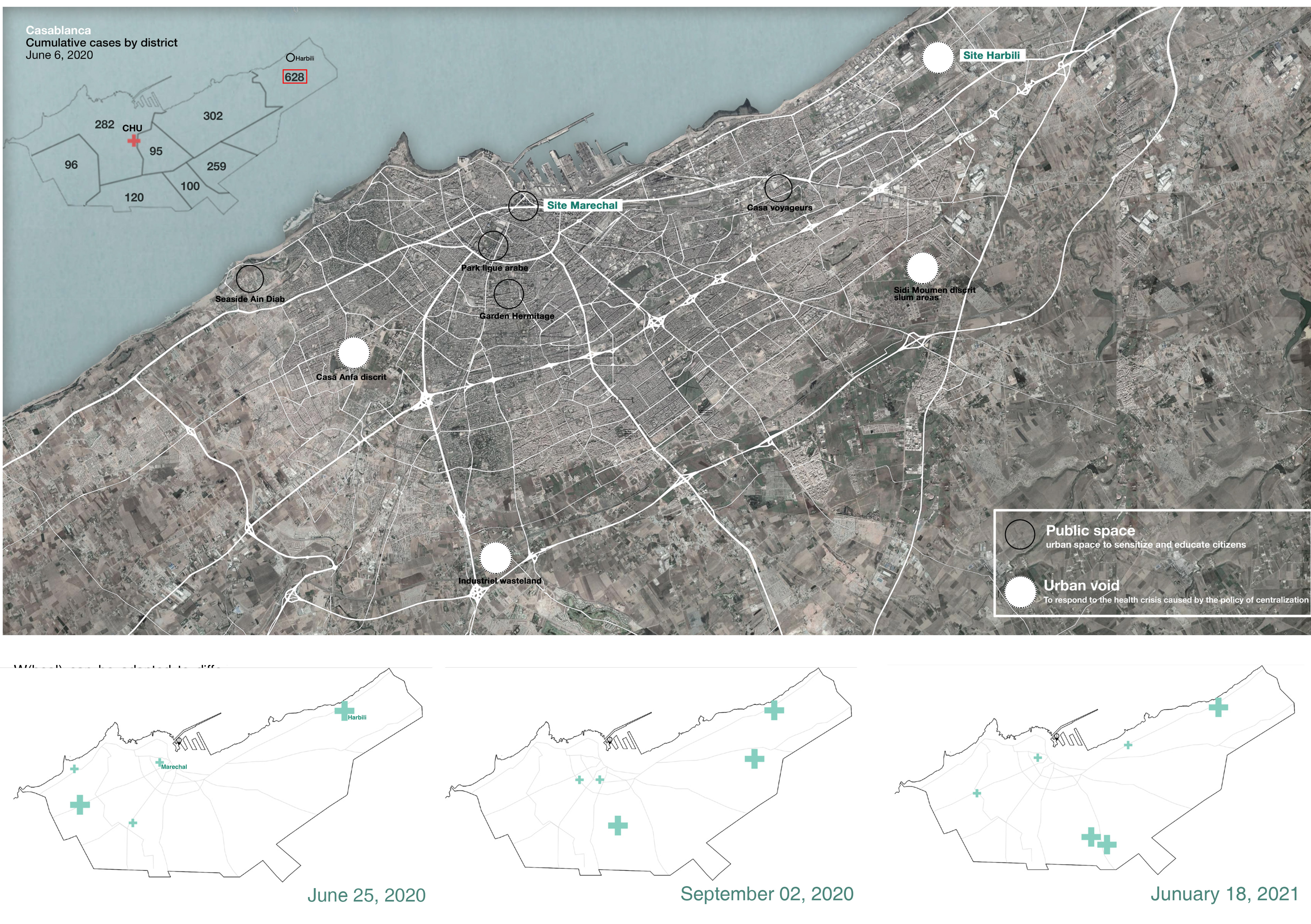
The project is a quick and effective response to the actual crisis, not only that, but it aims to improve the health infrastructure in the city.
Decentralizing the health care system constitutes an integral aspect of this process. Moreover, our project will reduce the environmental footprint by reusing old buses, and keeping the cultural heritage of this landmark that animated the skyline of the city for over than 25 years.
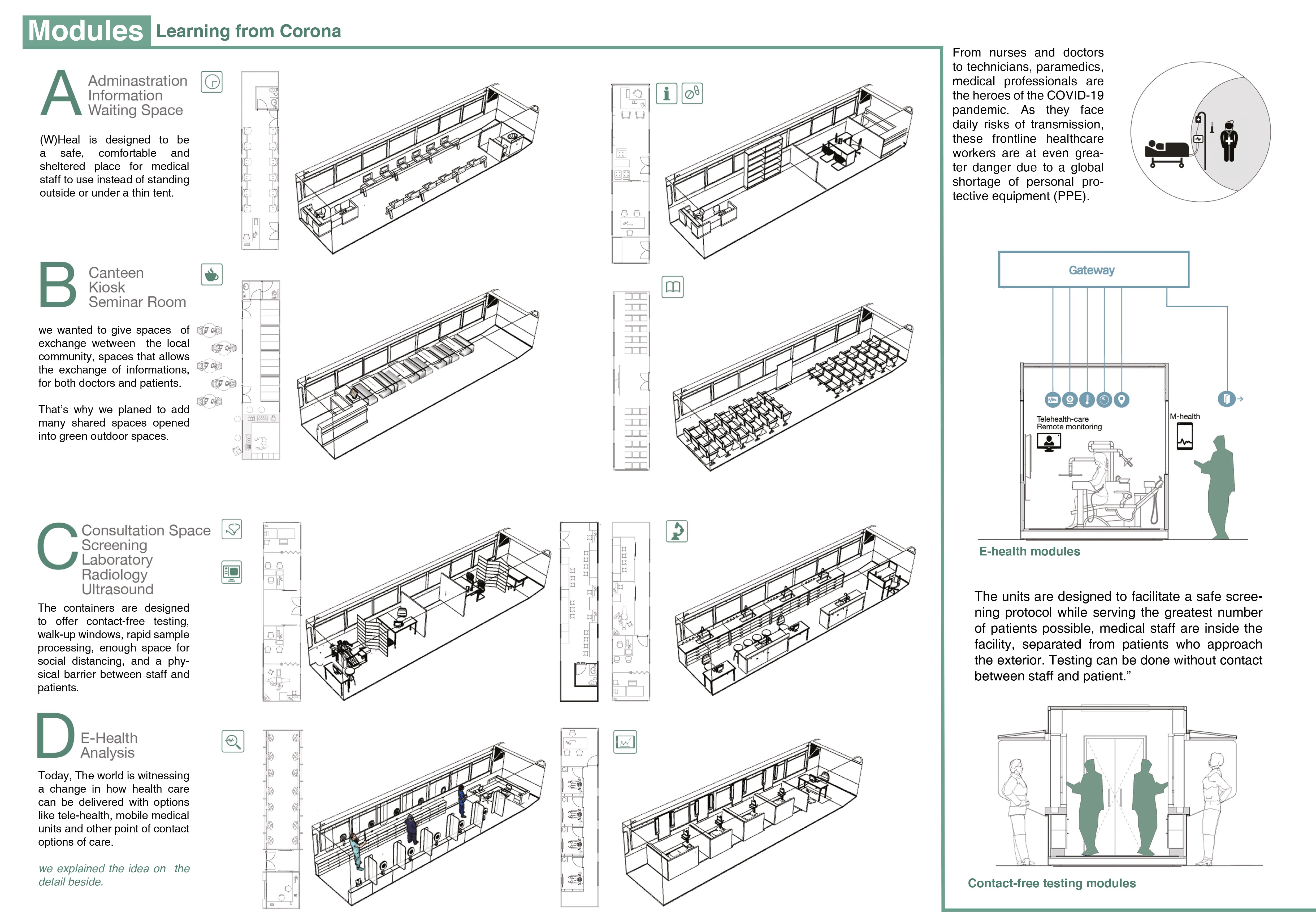
Post covid-19
(W)Heal will be later (post covid-19) on used for mass vaccination against the virus, and also for primary care, testing and screening for flu season and viral outbreaks, blood donation, delivering vaccines, as well as future public health needs, replacing the chaotic tiny health centers (temporary or permanent) that we found in every neighborhood in the city.
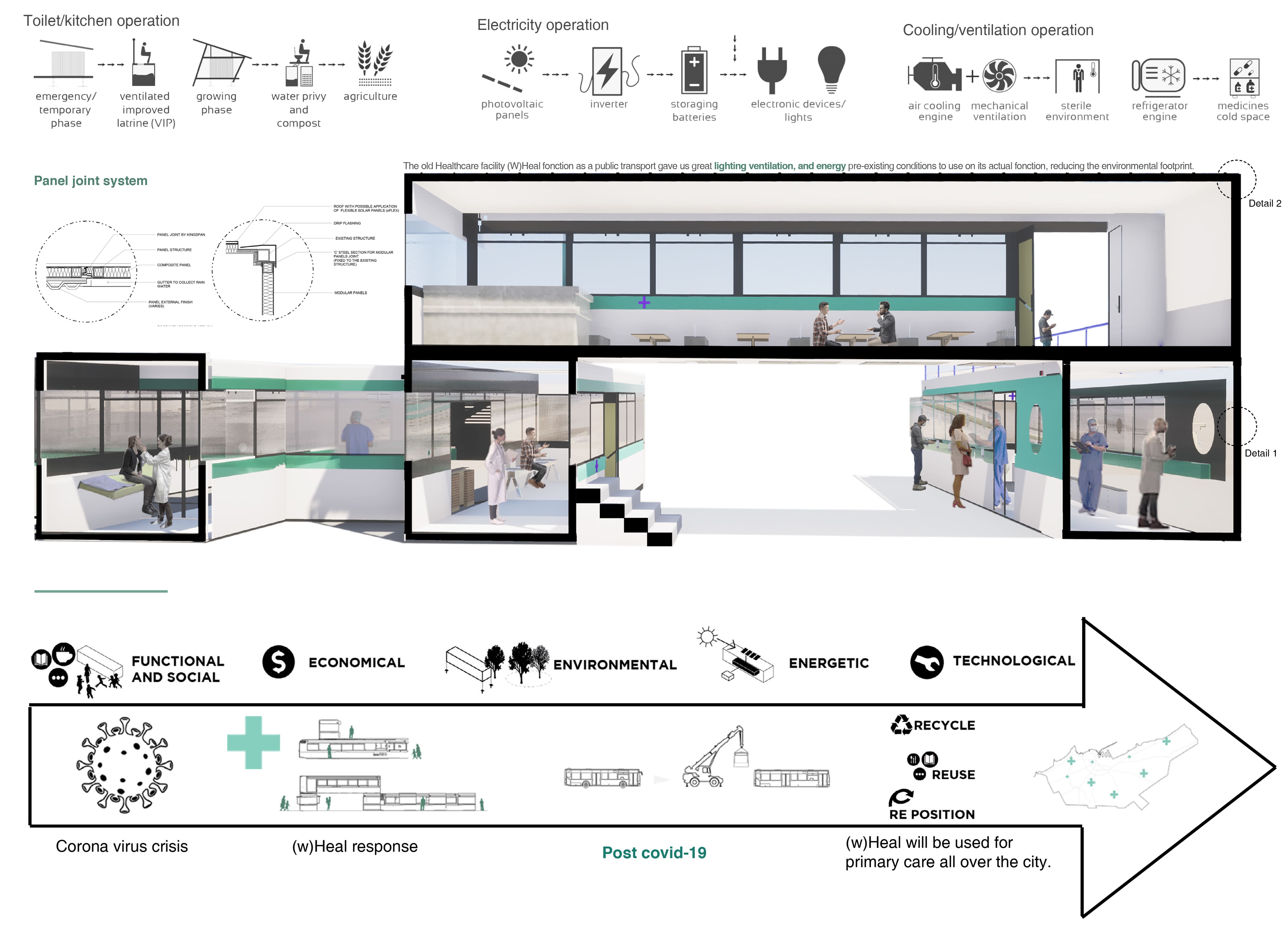
About the competition
In 2020, the Pittsburgh Platform, in collaboration with Chalmers University of Technology in Gothenburg, Sweden, and Carnegie Mellon University in Pittsburgh, Pennsylvania, USA, launched an Ideas Competition on how to ensure environmental health equity. This call for ideas aimed to push the envelope on how to establish environmental health equity and bring environmental health into the center of the debate on city planning.

